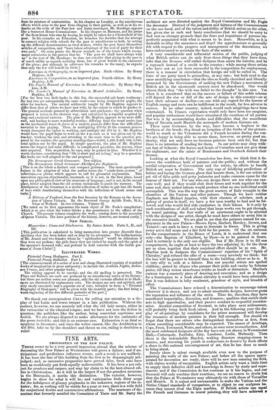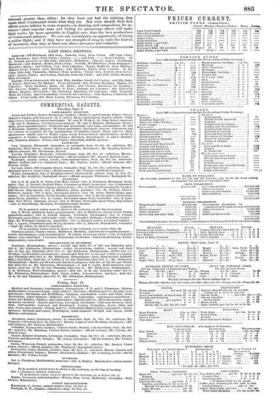FINE ARTS.
PROGNOSTICS OF THE NEW PALACE.
THERE seems to be a very general impression abroad that the scheme of decorating the New Palace at Westminster will prove a failure; and if an- ticipations and predictions influence events, such a result is not unlikely. It has been the fate of this building from the first to be disparagingly pre- judged; and, as successive prognostics have proved false, fresh ones have been as confidently put forth equally unfavourable. It has been a pet sub- ject for croakers and carpers, and may lay claim to be the best-abused edi- fice in Christendom. As it will be the largest if not the grandest structure
in the Metropolis, it merits this distinction. The exterior, however, begins to show for what it will be; and vaticination finds fitter scope for the indulgence of gloomy prophecies in the unknown regions of the in- terior; for, as nothing will be visible for a year or two, there is a wide field for conjectural doubts and constructive affirmations. The murmurs of dis- content that formerly assailed the Committee of Taste and Mr. Barry the architect are now directed against the Royal Commission and Mr. Pugin the decorator. Distrust of the judgment and fairness of the Commissioners on the one hand, and of the talent and ability of British artists on the other, has given rise to rash and hasty conclusions that we should be sorry to find rest on stronger grounds than the fears and impatience of persons im- perfectly acquainted with what is meant to be done. Meanwhile, as it is desirable to allay the uneasiness and dispel the apprehensions so generally felt with respect to the progress and management of the decorations, we have endeavoured to ascertain the facts of the matter.
A very considerable and influential section of the public, judging of what British artists can do only from those things that they have done, infer that the frescoes will rather disfigure than adorn the interior, and be a reproach instead of a credit to the country; while among those artists who have not as yet been successful in the competition for employment, there is a rumour in circulation that foreign aid will be called in. The fears of one party must be groundless, at any rate; but both tend to the same mortifying conclusion—that the idea so fondly cherished and liberally promoted by the Government, of making the new Palace a monument of British art in the nineteenth century must be abandoned. One would almost think that " the wish was father to the thought " in this case. Yet when it is considered that on the success or failure of this noble scheme will depend the rise or fall of the arts of design in this country—or at least their advance or decline—no one with any regard for the honour of English energy and taste can be indifferent to the result, far less adverse to success. In no other country, indeed, would such misgivings have been entertained. In France, expectation would only have been too sanguine, and popular enthusiasm would have stimulated the exertions of all parties. Nor was it by accumulating doubts and difficulties that the munificent King of Bavaria made Munich the metropolis of modern German art.
These same Germans, by the way, have become a bugbear to the brethren of the brush: they dread an irruption of the Goths of the picture- world as much as the Volunteers did a French invasion during the war. We are happy in being able to assure them, however, on pretty good au- thority, that not only have no German painters been sent for, but that there is no intention of sending for them. So our artists may sleep with- out fear of Schnorr; the horses and fiends of Cornelius need not give then( the nightmare, nor the saints of Bendemann and Overbeck disturb their dreams.
Looking at what the Royal Commission has done, we think that it de- serves the confidence both of painters and the public; and, without the cordial cooperation of Government and the artists, its efforts to benefit British art must be fruitless. The only way of falsifying predictions of failure and laying the German ghost that haunts them, is for our artists to get rid of false pride and petty jealousies and make common cause for the honour of their art. For one who can design there are ten who can exe- cute well; and if they would club their forces and work together for the same end, their united talents would produce what no one individual could accomplish. This was the way the great masters of Italy wrought in the chambers of the Vatican and other palaces. Though we have neither Raphaels nor Michael Angeles, with their clusters of scholars, each a galaxy of genius in itself, we have a few men. worthy to lead and be fol- lowed, and who would find able coadjutors in their labour. It is only by such combinations of skill and talent that large works can be got through. In mural painting, the four walls of an apartment ought to be adorned with the designs of one artist, though he must have others to assist him in the executive details. We are glad to see that the painters named for em- ployment in the new Palace—Messrs. Dyce, Herbert, Horsley, Severn, and Tenniel—are each to have a room to decorate in fresco. This is giving every artist full scope and a fair field for his powers. Of the six cartoons for the compartments in the House of Lords, it is understood that one only—the Baptism of Ethelbert, by Dyce—is to be painted in fresco. And it certainly is the only one eligible. But if Mr. Dyce is to fill one compartment, he ought at least to have the two adjoining it; for the three are so close together that their conjoined effect should be as one. Mr. Maclise took in dudgeon the Commissioners' rejection of his " Spirit of Chivalry," and refused the offer of a room—very unwisely we think: but the loss will be greater to himself than to the building, clever as he is. It is very silly to sulk at a failure. But our popular artists are spoiled children ; petted by cliques who pamper their pride and vanity by fulsome praise, till they resent unwelcome truths as insult or detraction. Maclise's cartoon was a masterly piece of drawing and execution; and as a design for a frontispiece to a book about chivalry it would have been admirable. But it was deficient in lofty sentiment, grandeur of style, and breadth of effect.
The Commissioners have evinced a determination to encourage talent wherever it is shown, and not to admit unsuitable designs, however great the reputation and influence of the artist. Thus far, therefore, they have manifested impartiality, discretion, and firmness; qualities that entitle their acts to high approbation, and their passive conduct to respectful consider- ation. Another competition of frescanti, to take place next midsummer, will probably bring forth fresh talent. And in the following year the die! play of oil-paintings by candidates for the prizes announced will develop the resources of modern painters in their full strength. Nor should we forget that there are others who distinguished themselves at first, from whom something considerable may be expected. The names of Armitage, Cope, Frost, Townsend, Watts, and others, at once recur to recollection. And the most celebrated designers of the day have not yet shown in Westminster Hall,—Cattermole, Eastlake Etty, Landseer, Leslie, Mulready. Then there is the indomitable littydon, making disasters stepping-stones to success, and renewing his youth in endeavours to deserve by fresh efforts a share in this national encouragement of art, that he has done so much to bring about. Surely there is talent enough available even now to the purpose of painting the walls of the new Palace; and before all the spaces appro- priated for decoration are ready, there will be new men entering the field, with claims worthy of recognition. English artists only want a little time to supply their defective skill and knowledge in fresco by study and expe- riment; and if the Commission do but continue as it has begun, and our frescanti will only combine their exertions, we see no reason to doubt but that the Palace at Westminster may ultimately vie with those of Versailles and Munich. It is unjust and unreasonable to make the Vatican and the Sistine Chapel standards of comparison, or to object to our sculptors be- cause they cannot rival the Elgin marbles. If British artists can equal the French and Germans in mural painting, they will have achieved I
triumph greater than either; for they have not had the training that made their Continental rivals what they are. But even should their first efforts prove inferior in some respects—in drawing and composition, for in- stance—their superior taste and feeling for picturesque effects will make their works far more agreeable to English eyes than the best productions of Continental painters. We owe our countrymen an opportunity of trying a nobler flight; and if they have not strength of wing to scale the heaven of invention, they may at least soar above grossness and vulgarity.



























 Previous page
Previous page